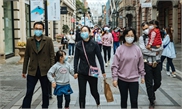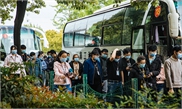Wuhan battles to create jobs
Many firms are hiring, but market remains under pressure
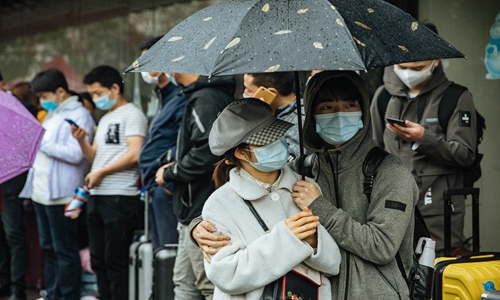
A heavy downpour fails to stop a crowd in Wuhan, capital of Central China's Hubei Province from gathering at Foxconn to apply for a job early Monday. Photo: Li Hao/GT
As many in Wuhan, Central China's Hubei Province, are gradually returning to work after a lockdown due to the novel coronavirus epidemic, some are facing quite a predicament: They have no jobs to return to.
That was on vivid display Monday, as job seekers in the city, undeterred by the pelting rain, formed long lines outside factories and businesses to apply for the limited positions offered.
While many companies in sectors such as manufacturing and services have started hiring and local officials have rolled out a flurry of measures from direct cash incentives to organizing hiring events, the overall job market in the city and the broader Hubei Province remains dire due largely to low business activity, job seekers, business insiders and analysts said. Many might not be able to get a job before the end of May as some small businesses are still struggling to get back on their feet, they added.
The gloomy employment situation in Wuhan also mirrors that of the entire country, as the coronavirus outbreak added pressure to an already challenging job market due to recent economic slowdowns and industrial transformation. Top Chinese officials paid much attention to employment, which is crucial not just economically but also in terms of social stability, and more targeted measures might be necessary, analysts noted.
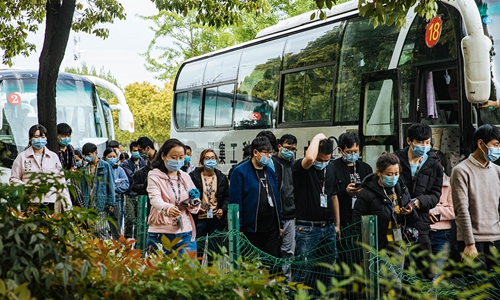
Photo: Li Hao/GT
Desperate to work
On Monday, the bad weather in Wuhan did not curb the enthusiasm of job seekers outside a local factory of manufacturing giant Foxconn Technology Group. Thickly dotting the empty field in front of the factory, which is half the size of a basketball playground, they filled the streets surrounding the factory.
"It is a difficult year," Jiang Yang from Xianning, another city in Hubei Province, 76 kilometers from Wuhan, told the Global Times. Jiang came to Wuhan in late March hoping to find a job but after knocking doors from one factory to another, he said he hasn't heard any good news yet.
A manager for the factory, who only gave his surname as Dong, said that they saw a surge of job hunters this year as they restarted operation on April 9, one day after the city lifted the 76-day lockdown.
"Five or six hundred people came for interviews each day on average. In the past few years, no one came for interviews on rainy days, but today we still have hundreds pouring in to try their luck," said Dong, noting Monday is the last day of his factory's recruitment drive.
There are encouraging signs, as the demand for workers are also surging in line with work resumption at major factories in the city, according to Zhu Liang, a representative for career services provider BOSS Zhipin's Wuhan division. For example, Foxconn, personal computer manufacture Lenovo and micro-electronics firm Wuhan Tianma are hiring more than 10,000 new workers this year.
Officials in Wuhan will also organize as many as 70 job fairs starting on Tuesday, which could offer a total of around 30,000 positions in a wide range of sectors, including manufacturing, retail and logistics, Hubei News reported on Monday.
Wuhan officials have also launched more than 300 online job fairs. On the jobs website operated by Wuhan's Human Resources and Social Security Bureau, there were more than 168,000 job listings and over 131,000 applicants as of Monday. The city has also offered nearly 19,000 public welfare jobs.
However, that might not be able to absorb the layoffs from consumer-centric businesses such as catering and entertainment, and the job market might not improve until the end of May, according to Dong Dengxin, director of the Finance and Securities Institute at Wuhan University of Science and Technology.
"As soon as these businesses return to normal, probably at the end of May in the best-case scenario, employment will be also boosted," Dong Dengxin told the Global Times, whisking off risks for potential social turmoil stemming from rising unemployment.
But before that, the situation still remains dire.
Wuhan's urban unemployment rate was at 2.02 percent at the end of 2019, lower than the national rate of 3.62 percent, according to official data. In 2019, the city added 242,500 new jobs, up 10.7 percent year-on-year. That number should not be hard to reach given the rising number of new job listings. However, there is extra pressure building up as many locals who failed to get a job outside of the province return, insiders and analysts pointed out.
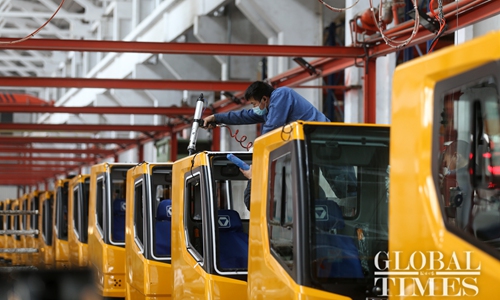
Photo:Cui Meng/GT
Extra pressure
Zhou Yulin from Hubei's Huanggang city said she returned to Wuhan on the weekend after she lost her job in a factory in South China's Guangdong Province. "The Guangdong factory was ordered to shut down when the virus was rife. When it reopened, the manager told me I was no longer needed. I tried my luck at other factories in both Guangdong and Fujian provinces. But they all turned their back on me when they heard I came from Hubei Province," said Zhou.
Zhou was not alone. Her experience was also shared by many job seekers waiting in front of Wuhan's factories.
According to Dong, the manager at Foxconn, this year they have also seen a larger proportion of Hubei workers than previous years. "Ninty percent of job hunters are Hubei locals this year; previously they only accounted for roughly 70 percent at most," he said.
Due to the gloomy situation, some have taken to lesser-paying jobs because there weren't any better options.
"I have a family of three to support, and shouldering a home loan by myself. I cannot sit idly and wait," said Chen Xingyang, who used to work as a restaurant manager in a local chain restaurant but has accepted an assembly job at the Lenovo factory that pays only half of what he used to make. "What can I do? You cannot be picky this year. Jobs choose us, not the other way around," said Chen.
Businesses also have no better options too when it comes to cutting paychecks.
"Our business has been thrown into dismay by the viral outbreak, as we are not yet allowed to provide dine-in services; and we don't have a large amount of delivery orders. Many of our employees were asked to wait at home until further notice, but I suspect some of them already gave up on waiting. Three months without income is unbearable for some, or even most, families," said Tong.
National issue
What Tong and many in Wuhan have to face are also faced by people across the country, as the coronavirus epidemic has dealt a major shock to businesses and has led to massive economic losses.
In March, the unemployment rate stood at 5.9 percent, slightly lower than the all-time high of 6.2 percent in February but sharply higher than the 3.62 percent in 2019, according to official data released on Friday.
"Wuhan is on the frontline in terms of stabilizing jobs, but this is very much a national issue. It is probably the most important issue because this is not just about the economy but also about people's livelihoods" Tian Yun, vice director of the Beijing Economic Operation Association, told the Global Times on Monday.
Top officials have also called for extra attention to the job market. A meeting of the Political Bureau of the Communist Party of China Central Committee held on Friday called for more efforts in "securing people's basic livelihoods," a reference analysts say represents more priority in policy to stabilize the jobs market.
Officials have also launched a slew of initiatives to boost jobs, including financial support to companies, particularly small and medium-sized enterprises (SMEs), and workers. The country could also issue special government bonds totaling 1 trillion yuan to support SMEs, infrastructure projects and expand consumption, according to media reports and analysts.
While the job market will also improve later in the year in keeping in line with economic recovery, in the short term, more policy support might be necessary to cushion the impact, analysts said.
"We definitely need more policy support to help the employment situation, more targeted funding to boost consumption, because only when businesses see rising orders, they feel comfortable expanding and hiring," Tian said, adding that as foreign demand is expected to fall due to the pandemic, consumption is the key to boosting both jobs and economic growth.


